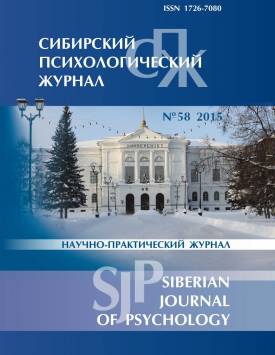Metacognitive structure of intellectual competence in late adolescence
Qualitative changes mark adolescence in many aspects, in particular in the area of intellectual development. The highest possibilities given by maturation of conceptual and metacognitive abilities and some personal characteristics, which in turn are necessary for productive activity in a particular subject area (intellectual competence) characterize this period. Thus, particular qualities of older adolescents are the basis for the study of intellectual competence in its components (metacognitive abilities). 90 students at the age of 15 (54 girls and 36 boys) of the 9th grade of Moscow schools participated in this study. We used such methods as "Diagnosing the degree of reflexivity technique"; "Matching Familiar Figures Test", and "Interpretation". According to the results of the correlation analysis, such manifestations of metacognitive control as voluntary intelligent control and involuntary intellectual control can describe the structure of intellectual competence. The results indicate the heterogeneity of metacognitive abilities formation or uneven participation of voluntary and involuntary control of mental activity. There is another explanation: more specialized techniques are necessary to identify involuntary control of intellectual activities. Intellectual competence construct requires some acts. They are information monitoring, activity choice, the flow of activity and its results tracking, as well as comparing planned and obtained results. This control is identified in our study on a voluntary level, and on more implicit level involuntary control was not detected. Thus, this study opens up the possibility of studying the intellectual competence manifestations in late adolescence. It will contribute to the development of new diagnostic methods of intellectual competence and its components, in particular to the role of intellectual control research.
Keywords
интеллектуальная компетентность,
метакогнитивные способности,
произвольная и непроизвольная регуляция интеллектуальной деятельности,
подростковый возраст,
гетерогенность,
intellectual competence,
metacognitive abilities,
control,
activities,
adolescenceAuthors
| Sipovckaya Yana I. | State Academic University for Humanity (Moscow) | syai@mail.ru |
Всего: 1
References
Веккер Л.М. Психологические процессы. Л. : Издательство Ленинградского универ ситета, 1976.
Сиповская Я.И. Дескрипторы интеллектуальной компетентности в старшем подрост ковом возрасте // Психология и педагогика: теоретические и практические аспекты современных наук : материалы XXVII Международной научно-практической конференции. М., 2014. С. 34-36.
Сиповская Я.И. Структура интеллектуальной компетентности в старшем подростко вом возрасте // Психология - наука будущего : материалы V Международной конференции молодых ученых / под ред. А. Л. Журавлева, Е.А. Сергиенко, Н.Е. Харла-менкова, К.Б. Зуева. М., 2013. С. 272.
Холодная М.А. Психология интеллекта: парадоксы исследования. СПб. : Питер, 2002.
Ким О.Г. Учебная деятельность в малых группах как фактор оптимизации уроков музыки в начальной школе : дис.. канд. пед. наук. М., 2013.
Берестнева О.Г. Моделирование развития интеллектуальной компетентности сту дентов // Известия Томского политехнического университета. 2005. Т. 308, № 2.
Козлова Н.В., Сивицкая Л.А., Качалов Н.А. Инновационные образовательные техно логии как условие развития профессиональных компетенций преподавателей высшей школы // Известия Томского политехнического университета. 2006. Т. 309, № 4. С. 240-243.
Карпов А.В. Рефлексивность как психическое свойство и методика ее диагностики // Психологический журнал. 2003. Т. 24, № 5. С. 45-57.
Холодная М.А., Берестнева О.Г., Кострикина И.С. Когнитивные и метакогнитивные предпосылки интеллектуальной компетентности в области научно-технической деятельности // Психологический журнал. 2005. Т. 26, № 1. С. 51-59.
Султанова Л.Б. Проблема неявного знания в науке. Уфа : Изд-во УГНТУ, 2004.
Raven J. The Ravens Progressive Matrices: change and stability over culture and time // Cognitive Psychology. 2000. Vol. 41, № 1. P. 1-48.
Киселева Т.С. Исследование инициативы личности в интеллектуальной деятельности // Психология индивидуальности : материалы Всероссийской конференции, 23 ноября 2006 г., Москва. М., 2006. С. 220-223.
Chamorro-Premuzic T., Furnham A. Intellectual competence // The Psychologist. 2005. Vol. 18, № 6. P. 352-254.
Chamorro-Premuzic T., Arteche A. Intellectual competence and academic performance: Preliminary validation of a model // Intelligence. 2008. Vol. 36. P. 564-573.
Асмолов А.Г. Формирование универсальных учебных действий в основной школе: от действия к мысли. М. : Просвещение, 2010. С. 57-61.
Kagan J. Reflection-impulsivity: The generality and dynamics of conceptual tempo // J. of Abnorm. Psychology. 1966. Vol. 71. P. 17-24.
Ядровская Е.Р. Развитие интерпретационной деятельности читателя-школьника в процессе литературного образования (5-11 классы) : дис.. д-ра пед. наук. СПб., 2012.
Савин Е.Ю. Понятийный и метакогнитивный опыт как основа интеллектуальной компетентности : дис.. канд. психол. наук. М., 2002.

